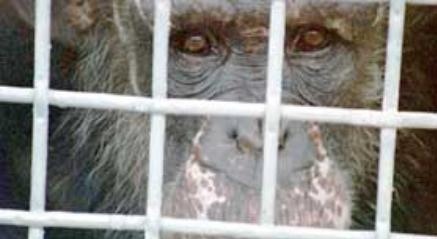Yerkes Grudging in Its Response to Phase-Out of Chimpanzee Research

The National Institutes of Health (NIH) is phasing out biomedical research with chimpanzees, requiring retirement to an approved sanctuary and raising standards for housing for those who do remain in research.
Yerkes National Primate Research Center, in Georgia, is one of eight NIH-funded national primate research centers, housing 78 chimpanzees. Short of finding sanctuary for most of these individuals, Yerkes may be required to make expensive modifications to existing housing for chimpanzees.
So, what is their response to this?
Yerkes spokesperson Lisa Newbern said in an email to the Atlanta Journal Constitution: “We are very concerned about what it will cost our center to adhere to the recommendations for the ethologically appropriate physical and social environments.” She complained that the new recommendations “would provide larger space per chimpanzee than many humans have in their own homes.”
The current environment for chimpanzees at Yerkes is far from conducive to their welfare or quality of life.
The grudging attitude in these statements belies any claims that Yerkes is concerned with chimpanzee welfare and shows that the facility’s “bottom line” is financial.
These statements are also very revealing in terms of how Yerkes views the animals it holds captive. Newbern’s concern about the cost of providing appropriate living space and social environments for chimpanzees reveals that the current environment for chimpanzees at Yerkes is inappropriate and far from conducive to their welfare or quality of life.
And in what can only be viewed as a resentful tone, Newbern suggests that chimpanzees should not have a larger living space than “many humans have in their own homes,” but neglects to take into account the obvious point that humans are able to leave their homes and freely go where they wish. This is a fundamental need of all chimpanzees and is denied to those held captive at research facilities such as Yerkes.
If Yerkes wants to create the public impression that they have any real concern about the animals at their facility, perhaps they need to do a better job of concealing their contempt for the animals in their “care”.
2 Replies to “Yerkes Grudging in Its Response to Phase-Out of Chimpanzee Research”
Comments are closed.

Yes, if you are going to keep non-domesticated animals in captivity, then trying to meet their needs is very difficult due to the amount of free space that they would require to get even a fraction of the freedom and opportunities and habitat they would have in a normal life. We can see with Yerkes’ response that they don’t want to spend the money to repay these individuals (these unwilling research subjects) for their involuntary service to “medicine.” It is primarily about using them for supposed human benefit at the expense of the chimpanzees’ own interests and rights.
Space and the freedom to move are simple requirements for mental health in both human beings and apes. Apes and orangutans in particular also need trees for their well-being.
Prof. Shawn Thompson, author of The Intimate Ape